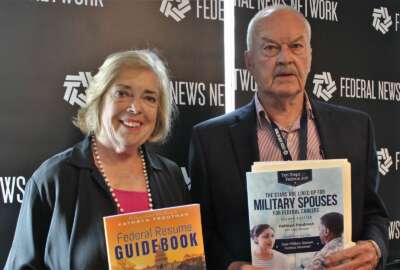DoD gives states recommendations on bettering military spouse licensing
DoD is giving states recommendations on how to improve the licensure reciprocity process.
About 34% of military spouses need state licenses to conduct their work, and in recent years the Defense Department and Congress have tried to make it easier for them to transfer those certificates when moving with their service member. However, the process is still far from perfect, and DoD is giving states recommendations on how to improve the licensure reciprocity process.
“Defense Secretary Mark Esper has added a fourth line of effort to the National Defense Strategy, which is taking care of military families,” Virginia Penrod, acting assistant secretary for manpower and reserve affairs told reporters Monday. “He’s also identified spouse licensure portability as critical to supporting families and has made this one of his key focus areas. As such, we will continue to work towards making licensure portability as seamless as possible.”
The report outlines immediate, near-term and long-term actions individual states can make to ease the burden on military spouses and expedite their license transfers.
Immediate actions include ensuring spouses can benefit from policies already in place and implementing policies in applications and procedures.
“What we found in a lot of circumstances through our own research, and through the research that was also done by the Department of Labor helping us on this particular part of the issue, is that the law may be implemented, but it is really difficult for a military spouse to find the appropriate form, find the appropriate location to put that form and get the guidance necessary to get through the licensing process as easily as possible,” Marcus Beauregard, director of the Defense State Liaison Office, said.
For near-term actions, DoD wants states to ensure military spouses have permanent or temporary exemptions so they can get to work quickly.
“Exemption from state requirements or having to provide verification documentation through the recognized best practices,” is one way DoD says states can do that. Another is “expedited practices by limiting the time boards take to adjudicate applications, as well as other processes that can expedite receiving a license.”
The end goal is for states to have interstate compacts to resolve the issue of license portability.
The 2020 defense authorization act allows DoD to enter into a cooperative agreement with the Council of State Governments to assist with funding for compacts.
One of the most successful compacts is for nurse licensures, which has 34 states; another 10 are considering it in 2020.
However, DoD wants to get to a baseline where military spouses can move anywhere in the United States, regardless of compact, and work for 30 days without submitting documents.
“Nurses can move from a compact state to another compact state without any relicensing,” the report states. “When nurses move to or from a non-compact state, then having ‘the 30-day, without submitting verification’ approach can help get them to work faster.”
Beauregard mentioned some states who are leading the way.
“Arizona has developed something called ‘universal licensing,’” he said. “What it does is it says that an individual comes in with a current license. The state will accept that license as long as it’s current and in good standing. The individual gets a background check and pays the appropriate fees, and then they can get a license from Arizona. Utah has even a more progressive approach. Utah, since 2012, has allowed military spouses to come into the state and work on their license from another state without getting a Utah license.”
The National Military Family Association (NMFA) expressed its support for the report.
“We appreciate DoD providing each state with a ‘performance report’ of sorts — highlighting where they are in the process of expediting licensure reciprocity and showing them where they can improve,” Jennifer Davis, deputy director for NMFA government relations told Federal News Network. “While we understand that interstate compacts provide the smoothest option in transferring an occupational license across state lines and appreciate congressional action regarding interstate compacts in the 2020 NDAA, compacts do take time to stand-up. Clearly defining reciprocity and illustrating immediate and short-term ways to grant that reciprocity assists states seeking to provide more support to military families and provides a smart and flexible way to engage the issue of license reciprocity for military spouses.”
Copyright © 2024 Federal News Network. All rights reserved. This website is not intended for users located within the European Economic Area.
Scott Maucione is a defense reporter for Federal News Network and reports on human capital, workforce and the Defense Department at-large.
Follow @smaucioneWFED
Related Stories






